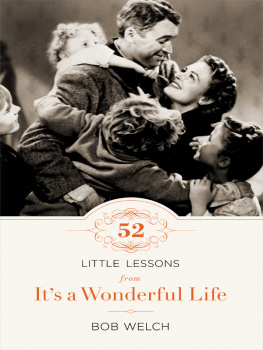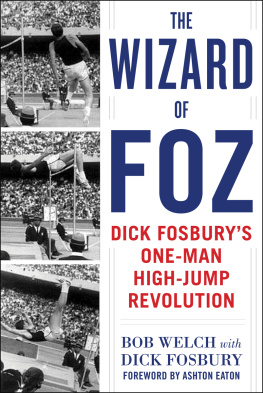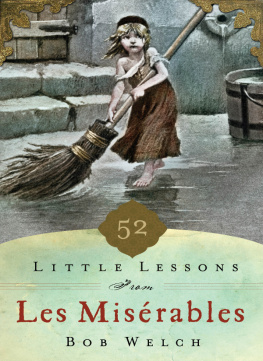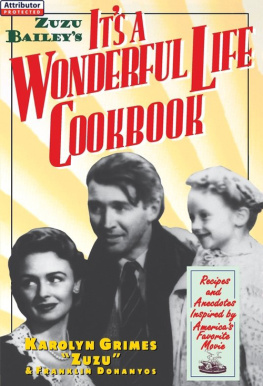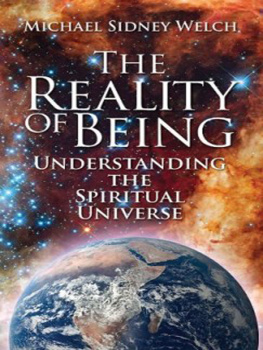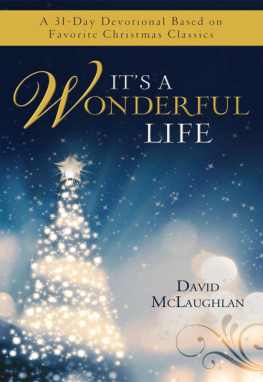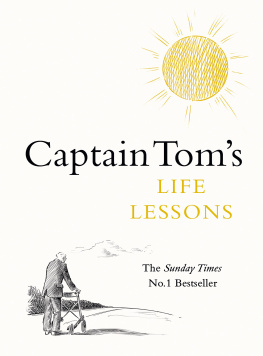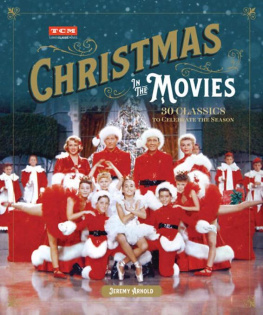
LITTLE LESSONS FROM
Its a Wonderful Life
2012 by Bob Welch
All rights reserved. No portion of this book may be reproduced, stored in a retrieval system, or transmitted in any form or by any meanselectronic, mechanical, photocopy, recording, scanning, or otherexcept for brief quotations in critical reviews or articles, without the prior written permission of the publisher.
Published in Nashville, Tennessee, by Thomas Nelson. Thomas Nelson is a trademark of Thomas Nelson, Inc.
Thomas Nelson, Inc., titles may be purchased in bulk for educational, business, fund-raising, or sales promotional use. For information, please e-mail SpecialMarkets@ThomasNelson.com.
Movie quotes and some scene descriptions are from the motion picture Its a Wonderful Life, released in 1946 and directed and produced by Frank Capra.
Unless otherwise indicated, Scripture quotations are taken from the Holy Bible, New International Version, NIV. 1973, 1978, 1984 by Biblica, Inc. Used by permission of Zondervan. All rights reserved worldwide. www.zondervan.com
Scripture quotations marked NKJV are from THE NEW KING JAMES VERSION. 1982 by Thomas Nelson, Inc. Used by permission. All rights reserved.
Library of Congress Cataloging-in-Publication Data
Welch, Bob, 1954-
52 little lessons from Its a wonderful life / Bob Welch.
p. cm.
Includes bibliographical references (p. ).
ISBN 978-1-4002-0393-2
1. Its a wonderful life (Motion picture) I. Title.
PN1997.I758W45 2012
791.437--dc23
2012010657
Printed in the United States of America
12 13 14 15 16 QG 6 5 4 3 2 1
To those with the conviction to believe and those with the courage to explore.
The great need is not to do things, but to believe things.
OSWALD CHAMBERS
Contents
A BANK IN THE CITY WHERE I LIVE HAS AN INTERESTING requirement for all new employees going through their orientation: they must watch a series of scenes from Its a Wonderful Life.
The message in that film, the bank president told me, is the message we want our employees to come to work with every day: the idea that our actions make a difference in the community around us.
I first watched the movie as a home-from-college kid in the mid-1970s. And over the decades Ive come to appreciate the same thing that bank president appreciates about the movie. It is an hour-and-a-half-long teachable moment.
From time to time over those years, I jotted down some of those lessons. Before long, I realized I had a lesson a week for a year: fifty-two bite-size nuggets of wisdom. Thus, the movie can be more than just holiday entertainment. Though our family, like so many others, has its traditional December viewing, it can inspire us to live better lives. To recognize what really matters. To be people of honor and integrity.
For nearly four decades, Ive made my living writing books, magazine articles, and newspaper stories with a decided emphasis on people who inspire. George Bailey, Mary Hatch, and many of the rest of the Its a Wonderful Life cast certainly qualify as examplesand, in essence, they live on in all who take to heart the quiet but character-enriching lessons found in Bedford Falls.
Bob Welch
Eugene, Oregon
God Honors Our Childlike Faith
Yes, but hes got the faith of a childsimple.
FRANKLIN THE ANGEL
ITS A WONDERFUL LIFES OPENING SCENE OFFERS ONE OF those blink-and-you-miss-it life lessons whose profundity might easily get lost. High in the heavens, the angels Joseph and Franklin, represented by two pulsing stars, are discussing who might be sent down to earth to deal with a suicidal man named George Bailey. Joseph suggests its an angel named Clarences turn, although, he laments, Hes got the I.Q. of a rabbit.
Yes, says Franklin, but hes got the faith of a childsimple.
This is high praise. Not only is it coming from an angel but apparently from a high-ranking angel, given that Franklin has the ultimate authority to make the call on who will be sent to earth in an attempt to save a mans life. Presumably, the angel pool stretches far beyond Joseph and Clarence. And yet Clarence is Franklins chosen one in this case.
Why? Its certainly not because of his track record. Clarence is, after all, only an Angel Second Class. He hasnt earned his wings yet, and Franklins comment that Weve passed him up right along suggests its not because he hasnt been given the chance to prove himself. Clarence himself suggests he has something of a sketchy record, telling Franklin hes been waiting for more than two hundred years to earn his wings, and people are beginning to talk. Clearly, this is an angel with problems, not the least of which is an inferiority complex.
The idea that Clarence may not be the sharpest knife in the angel drawer is only underscored by his last name Odbodywhich not only suggests he is a tad quirky but may, in fact, come from a long line of quirky folks. Physically, hes underwhelming, sort of a Caspar Milquetoast in a seventeenth-century, embroidered nightshirt. And his ineptness is only bold-faced by Josephs I.Q.-of-a-rabbit comment, assuming, of course, that Josephs views arent skewed by some sort of bias. And apparently theyre not, given that Franklin doesnt disagree with Joseph on the matter. He seems to suggest that, yes, that may be true, but more important things are at work here.
Chief among those other things, Franklin suggests, is the angels faith. And this is something so important that it trumps everything else.
So, exactly what is this childlike faith that Franklin holds in such high esteem? For starters, its something not to be taken lightly. In Matthew 19:14, when the disciples rebuke those who have brought little children to Jesus, what does Jesus say? Let the little children come to me, and do not hinder them, for the kingdom of heaven belongs to such as these.
Clearly, Jesus is big on children. He sees something special in them. He defends them in much the same way Franklin sees something in Clarence and defends him. But what is it about childrens approach to faith thats so engaging? Though Jesus doesnt get specific about that, the answer is in their approach to life. As children, we are not jaded by the sophistication of the world. Were real. Were humble. Were willing to admit our needs and trust that others can help us. Were unpretentious and adventurous. Were lighthearted and imaginative. And were fearless, willing to take a riska juvenile version of what the early twentieth-century Bible teacher Oswald Chambers calls reckless joy. And then, of course, we grow up. And what happens? In many cases, we get jaded by the world. Instead of being real, we rationalize behaviors. We learn to put our personal spin on our shortcomings rather than deal with them. We become pretentious. We throw ourselves into all sorts of physical adventure but are cowardly regarding relationships, flitting from one person to the next, lacking the courage to commit.
We hide our needs from others. From God. From ourselves. We play it safe, settling for too little in life. Rather than live by faith, we embrace one of many forms of legalism, be it a secular or religious version. Rather than try to please God with simple faith, we complicate things by trying to prove to Him how worthy we are by our works. Were full of fear, but we mask it with everything from busyness to addictions to rationalization, as we desperately seek to convince ourselves that were content. In reality, we know little of Chamberss reckless joy.
Not Clarence. No, sir. Hes the real deal, living for some deeper ideals instead of simply going with the flow, ideals that stem from his childlike approach to life. Nicks Bar may be serving hard drinks for men who want to get drunk fast, but Clarence orders the mulled wine, heavy on the cinnamon and light on the cloves. Hes unpretentious and honest. (I didnt have time to get some stylish underwear. My wife gave me this on my last birthday. I passed away in it.) Hes imaginative; remember, the point of insight on which the entire movie turnsGeorge seeing what life would have been like without himwas Clarences idea. And finally, hes a simple man erangel, full of childlike faith.
Next page
